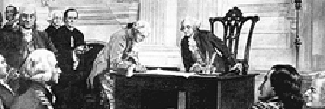Overview
Essential Purpose
This module will provide an opportunity for students to understand the historic foundations of our current political system; to understand the reasons for and the protections provided by the Bill of Rights; and to understand the necessity of assuming civic responsibility if these rights are to be preserved.

This is not a civics module on how our government operates; but rather, a historical perspective on how our government evolved and is able to provide basic constitutional protections while providing opportunities for us to exercise our civic responsibilities.
National History Standards
Era 3 (1754 – 1820s)
Revolution and the New Nation
Standard 3: The institutions and practices of government created during the Revolution and how they were revised between 1787 and 1815 to create the foundation of the American political system based on the U. S. Constitution and the Bill of Rights.
Standard 3A: The student understands the issues involved in the creation and ratification of the United States Constitution and the new government it established.Standard 3B: The student understands the guarantee of the Bill of Rights and continuing significance.
- Examine the influence of ideas:
- (5-12) Analyze the features of the Constitution, which have made this the most enduring and widely imitated written constitution in world history.
- Examine the influence of ideas:
- (5-12) Analyze the significance of the Bill of Rights and its specific guarantees.
State/Local Standards
States should align these modules to their own state/local standards as appropriate.
Essential Questions
- What fundamental ideas about government evolved over time and now form the basis for our system of government?
- Why is the Bill of Rights so essential to the protection of our basic rights?
- How do citizens protect their own rights by actively protecting the rights of others?
Essential Content
Ideas Brought by the Founders to the Colonies- Natural Rights
- Consent of the Governed
- Purposes of Government
- Due Process
- Freedom of Religion
- Freedom of Expression
- Equal Protection of the Law
- Freedom of Assembly
- Freedom of Speech
- Rights versus Responsibilities
- Common Good
- Duties of a Good Citizen
- Importance Of Participating in the Political Process
- Importance of Protecting the Rights of Others
Essential Skills
Standards in Historical Thinking
Standard 3: Historical Analysis and Interpretation- Compare and contrast differing sets of ideas, values, personalities, behaviors, and institutions
- Analyze cause-and-effect relationships and multiple causation; including, the importance of the individual and the influence of ideas and the role of chance
- Formulate a position or course of action on an issue.
Summative Assessment
This summative assessment and scoring guide should be reviewed with students prior to using the activities in the module. Students should do the assessment after the activities have been completed.
Essential Question Addressed by the Summative Assessment
- How do citizens protect their own rights by actively protecting the rights of others?
|
Prior Knowledge
Problem
Role/
Perspective Product
Criteria
for an Exemplary Response
Performance
|
Now that you have learned about how our government was formed and how our basic rights are protected by our Constitution, you are ready to think about how a good citizen acts responsibly in a democracy while protecting the rights of others. At the last meeting of the city council there was a discussion about what to do with a new piece of property that just became available to the town when a huge old parking lot was torn down. A vote on what to do with the property will be taken at the next meeting. You represent the citizens of this town on the town council. You know your community well and you know that certain interest groups will attend the meeting and will want their opinions considered. For example:
Create five guidelines for the meeting that will allow for full discussion of the issues involved. Be sure you have a guideline for each of the following:
|

 Module Menu
Module Menu Printable View
Printable View

 Scoring Guide
Scoring Guide